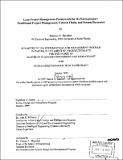| dc.contributor.advisor | John R. Williams. | en_US |
| dc.contributor.author | Sanchez, Marcos A. (Marcos Ariel), 1965- | en_US |
| dc.contributor.other | System Design and Management Program. | en_US |
| dc.date.accessioned | 2005-09-27T20:55:16Z | |
| dc.date.available | 2005-09-27T20:55:16Z | |
| dc.date.copyright | 1999 | en_US |
| dc.date.issued | 1999 | en_US |
| dc.identifier.uri | http://hdl.handle.net/1721.1/29151 | |
| dc.description | Thesis (S.M.)--Massachusetts Institute of Technology, System Design & Management Program, 1999. | en_US |
| dc.description | Includes bibliographical references (leaves 75-77). | en_US |
| dc.description.abstract | The thesis presents a lean and efficient project management framework that addresses many of the project management challenges found in an entrepreneurial environment. The framework contains an optimal and practical combination of the most critical and successful elements of traditional project management and concepts from critical chain management and system dynamics. The project management approach focuses on improving management efficiency within an entrepreneurial setting. The proposed project management framework does this by accomplishing the following: 1) establishes the over-arching objective of project management, 2) identifies the fundamentally, critical elements and value-added elements of project management, and 3) proposes an appropriate set of approaches, methods and tools. An important value-added element in the proposed project management framework is the ability to quantify the cost and quality implications that occur when new requirements or significant changes are forced on the product and project. The framework is developed from an entrepreneurial perspective and therefore emphasizes a project management approach that is effective (intuitive framework that captures essential, value added elements), efficient (requires low maintenance and does not become a project in itself), and flexible (approaches and methods proposed are responsive to change). The framework also emphasizes the importance of viewing and managing the project from a systems perspective so that better decisions about the tradeoffs can be accomplished. The combination of traditional project management, critical chain management and system dynamics helps to produce a robust and holistic representation of the project that provides idealistic, realistic and pessimistic views of the project. The proposed framework offers a consolidated project management method to help managers in an entrepreneurial environment in the following three key areas: 1) effectively plan and manage the development effort, 2) understand and communicate the effects of changes to the project, and 3) develop better contingency plans. | en_US |
| dc.description.statementofresponsibility | by Marcos A. Sanchez. | en_US |
| dc.format.extent | 77 leaves | en_US |
| dc.format.extent | 6553458 bytes | |
| dc.format.extent | 6553214 bytes | |
| dc.format.mimetype | application/pdf | |
| dc.format.mimetype | application/pdf | |
| dc.language.iso | eng | en_US |
| dc.publisher | Massachusetts Institute of Technology | en_US |
| dc.rights | M.I.T. theses are protected by copyright. They may be viewed from this source for any purpose, but reproduction or distribution in any format is prohibited without written permission. See provided URL for inquiries about permission. | en_US |
| dc.rights.uri | http://dspace.mit.edu/handle/1721.1/7582 | |
| dc.subject | System Design and Management Program. | en_US |
| dc.title | Lean project management framework for the entrepreneur : traditional projects management, critical chain, and systems dynamics | en_US |
| dc.type | Thesis | en_US |
| dc.description.degree | S.M. | en_US |
| dc.contributor.department | System Design and Management Program. | en_US |
| dc.identifier.oclc | 45258894 | en_US |
